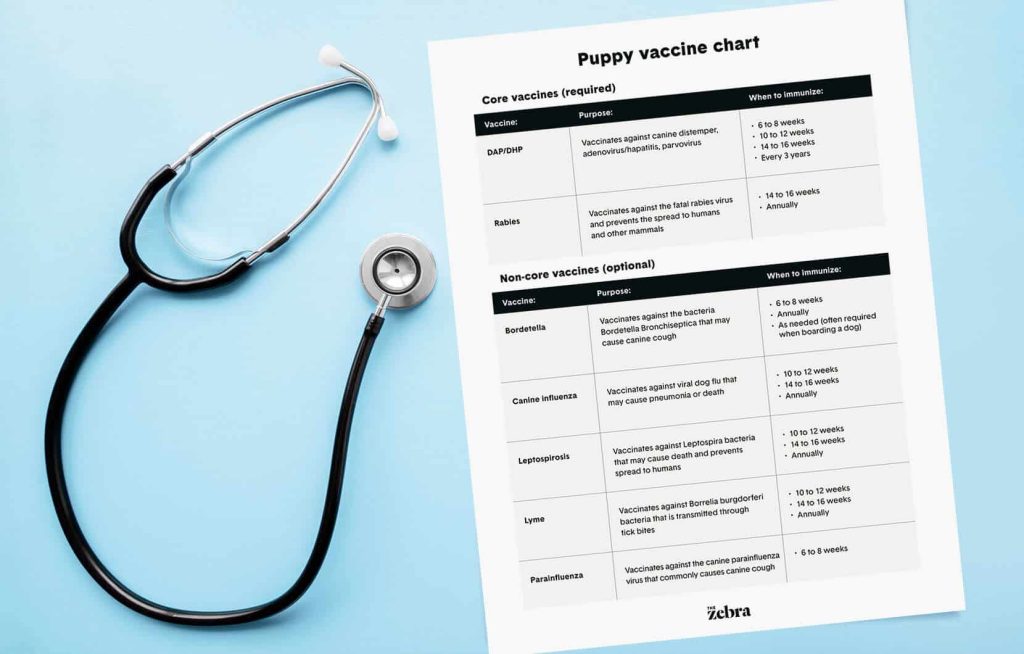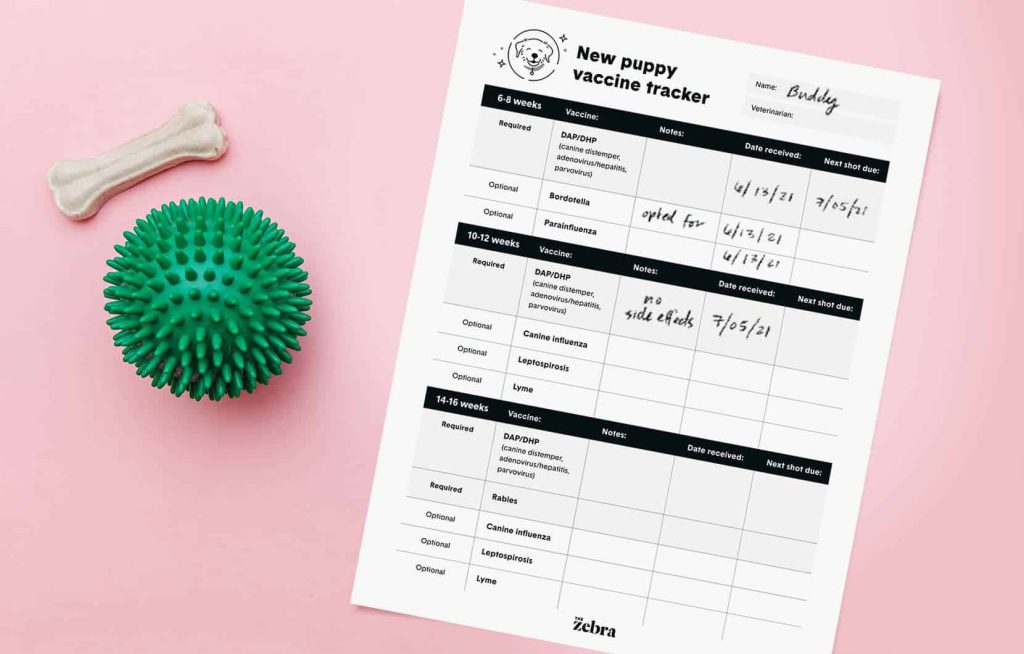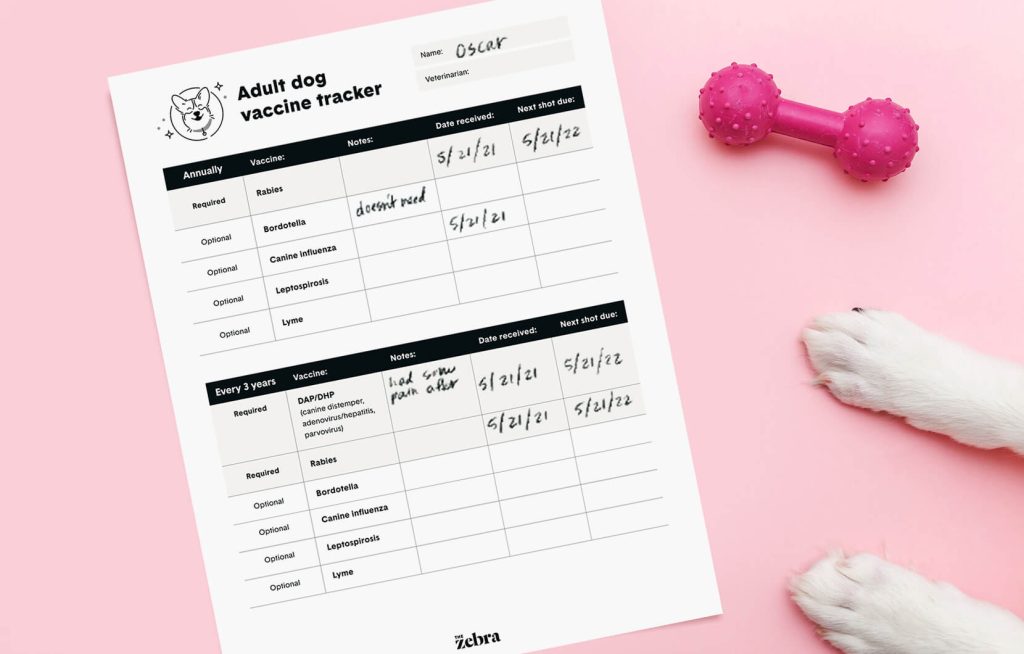If you are looking for a dog vaccination schedule chart, you have come to the right place. This page is all about what shots your dog needs and when to get them. Once the excitement of welcoming a new puppy or adopted dog into your home wears down, the responsibilities of being a good owner begin to set in.
We all know how much happiness a dog can bring to our lives, but this comes with a few obligations. One of the most important parts of owning a dog is prioritizing its well-being and health.

Dog Vaccination
Schedule Chart
Whether you’re purchasing organic kibble or the best CBD oil for your new pup, you want to make sure your bases are covered. Dog vaccinations prevent your puppy from becoming infected and spreading harmful diseases to you and other animals. After all, a happy dog means a happy life!
If you’re in the market for a new dog and are curious about how to keep them happy and healthy, look no further. Here is a dog vaccination schedule chart to keep you on track with necessary vaccinations and other helpful tips to best protect your pup.

Dog Vaccination Schedule Chart
According to veterinarians, puppies should receive their first few vaccinations at ages six to eight weeks. At this young age, vaccines will help them fight off possible illnesses that could result in death. After this first round of shots, they should receive booster shots every two to four weeks. This process should continue until they are around 16 weeks old.
What Shots Do Puppies Need?
Core vaccines are vaccines that contain vital disease protection for your pet, and they are usually required. Core vaccines limit the chance of high-risk exposure and your dog’s ability to spread a virus or disease to other animals or humans.
The main core vaccines protect against rabies, canine distemper, adenovirus (hepatitis), and parvovirus. These have very serious risks for dogs, and vaccines are very effective at reducing your dog’s chance of contracting one of them.
Non-core vaccines help protect your dog in environments where they come in close contact with other dogs, like kennels or dog parks. While they’re not essential, they are also a great option to protect your pet. To learn more about what shots your puppy does and doesn’t need, download this printable dog vaccination schedule chart!

Canine distemper, Adenovirus, and Parvovirus
Being aware of what specific diseases vaccines protect against will make you feel secure as an owner. The DAP/DHP shot, which all veterinarians offer protects against three viruses:
- Canine distemper virus: Highly contagious and can affect a puppy’s gastrointestinal tract and nervous system.
- Canine adenovirus/hepatitis: Causes inflammation of the liver. Young dogs have the greatest risk of contracting this virus.
- Canine parvovirus: Highly contagious, can be fatal, and affects the gastrointestinal tract. If your dog is infected, you must seek immediate medical attention.
- Rabies
You may be familiar with rabies from hearing stories of the dangers that rabid animals can cause to people and animals. Rabies is a viral disease that causes the central nervous system of all mammals to become irregular. This can lead to aggressive behavior, staggering, and even paralysis. Rabies is transmitted from one infected mammal to another and can be fatal to dogs, so it’s best that your dog is protected from this disease.
Puppy Dog Vaccinations

Puppy Vaccination Schedule
Now that you know about the different types of diseases and vaccines that are available for dogs, it is time to schedule veterinary appointments. It might seem tricky to keep up with your puppy’s shots, but it doesn’t have to be.
Whether your dog is 6-8 weeks, 10-12 weeks, or 14-16 weeks, they will require different shots. Stay on top of all of your puppy’s shots by downloading this printable puppy vaccine schedule.
Adult Dog Vaccinations

Do Adult Dogs Need Shots?
If you are proud to adopt, not shop, you may be wondering if your new adult dog needs shots. The answer to this: yes! Adult dogs need the same shots as puppies, but less frequently.
Your adult dog will need its core shots if they have not received them already. Asking your veterinarian what specific vaccines can help your older dog will keep you updated. Most adult dogs will get their vaccines annually or every three years.
Now that your dog is an adult, it’s easy to forget that they still need shots so often. Use this adult dog vaccine tracker to record past and future appointments for your dog.
Dogs are man’s best friend, so why not give them the best? After receiving their vaccines, your dog will be safeguarded from future diseases. If you want to learn more about dog vaccinations and pet insurance, visit The Zebra.


![Why Do Puppies Prefer To Sleep On Cold Floors? [Here Is Why]](https://www.dog-breeds-expert.com/wp-content/uploads/2022/05/Why-Do-Puppies-Prefer-To-Sleep-On-Cold-Floors.webp)
